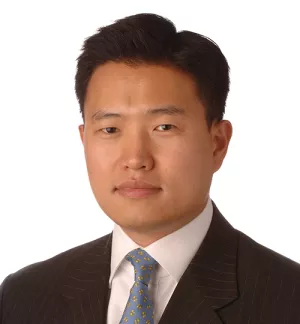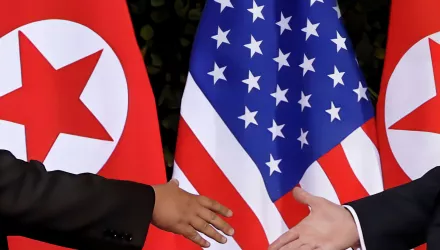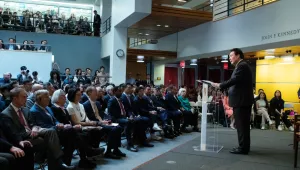Recent reports on the ill health of North Korean leader Kim Jong Il have renewed speculation over his succession and the country’s future. Chronic food shortages and stalled denuclearization activities have added more variables into the situation.
John Park is a Senior Research Associate for Northeast Asia in the Center for Conflict Analysis and Prevention and director of the United States Institute of Peace's Korea Working Group. In this interview, he discusses possible scenarios for North Korea's future.
What is the status of North Korean leader Kim Jong Il's health?
Compared to previous rumors about Kim Jong Il's health, recent reports are deemed to be credible. Kim is known to have serious chronic heart and kidney problems. Baseline thinking among North Korea analysts at present is that Kim's health issues -- in this instance a stroke -- have incapacitated him. Debate now revolves around how incapacitated he is. Will he be able to recover or will his initial condition deteriorate?
What are the implications of Kim's weak health on multilateral denuclearization efforts?
As debate continues, questions are growing in Washington, Seoul, and Beijing regarding North Korea's leadership succession and its implications. On this matter, many North Korea analysts assert that a collective military leadership is likely to emerge in Pyongyang should Kim's health problems lead to a succession crisis. While one of Kim's three sons (Kim Jong-nam, Kim Jong-chul, Kim Jong-eun) or his brother-in-law (Jang Sung-taek) may be picked to be the symbolic head of the group, these analysts believe that all major policy decisions would be made by the collective military leadership.
This potentially has serious implications for the Six-Party Talks among a host of other issues. Senior North Korean military leaders are widely believed to be strong proponents for maintaining a nuclear deterrent. With North Korea's massive conventional armed forces deteriorating rapidly in terms of outdated armaments and supply shortages, North Korean military leaders view the nuclear arsenal as much more important than just a bargaining chip -- it is deemed to be a strategic force equalizer in light of superior South Korean and U.S. military capabilities on the Korean Peninsula.
What are the long-term goals of the U.S., China, South Korea, Japan and Russia regarding North Korea? What would each ideally like to see?
All five countries have repeatedly stated the importance of maintaining stability on the Korean Peninsula by resolving security issues through dialogue and negotiations. These countries have also stated a preference for gradual and peaceful reunification, led by the two Koreas and supported by the regional powers. Given the uncertainty surrounding Kim Jong Il’s health and how leadership succession will play out in Pyongyang, these preferences will be tested by how unfolding events in a post-Kim situation will impact these countries’ respective national security interests.
During what period was a contingency plan seriously considered for implementation? What major changes have occurred since then?
Following massive floods and crop failures in North Korea in the mid-1990s, a chronic food shortage deteriorated into what now is referred to as the Great Famine. Several hundred thousand North Koreans are estimated to have perished. Fearing a failed state on its only border, the South Korean government braced for a humanitarian disaster. A main focus of Seoul’s response plan is administering humanitarian relief in the North.
Much has changed since then. In October 2006, Pyongyang conducted a partially successful nuclear test following a period of renewed production of weapons-grade plutonium in 2003 at the Yongbyon nuclear complex. Should there be a post-Kim Jong Il leadership succession crisis in the near term, a major dilemma will be the security of North Korea’s significantly expanded nuclear arsenal—a dilemma compounded by the fact that the precise location of all weapons-grade plutonium is largely unknown.
Another important change since the Great Famine is the growth of China’s economic interactions with North Korea and rebuilding the bilateral relationship. Benefiting from economic agreements signed by senior Chinese and North Korean officials in the mid-2000s, Chinese companies have been active in developing North Korea’s investment-starved mining sector. China has more at stake now as it seeks to promote stability and sustainable economic development in northeastern Asia.
What is the biggest concern among North Korea analysts as Kim Jong Il’s health crisis unfolds?
Although we have known about Kim’s health problems for years, almost no major coordination has taken place among Washington, Beijing and Seoul in preparation for the potentially rapid development of uncertainty and instability following an event such as Kim Jong Il’s death. If this lack of coordination continues among these three countries, there is a reasonable likelihood that once implemented, these contingency plans could lead to a situation resembling a partitioned North Korea. Given that each country’s contingency plan has a different primary focus, uncoordinated actions will likely produce ineffective and delayed results.
Beijing, Washington and Seoul may eventually be compelled to commit their respective troops for different tactical objectives and operations in North Korea—these missions range from ensuring law and order in the Sino-DPRK border region to securing North Korean Weapons of Mass Destruction to administering humanitarian assistance.
While a smooth transition to a collective military leadership in a post-Kim Jong Il period could provide the best prospects for internal stability in North Korea, this possibility has to be treated as highly uncertain in light of anemic sources of information about the North Korean regime. Almost all reports about the regime are based on rumors or anecdotal evidence. As a result, too often coincidence is mistaken for correlation or causation. This all points to the urgent need for coordination among Beijing, Washington and Seoul in preparing for the aftermath of a potential succession crisis-induced state of instability in North Korea.
Describe USIP's work on Korean Peninsular issues.
USIP regularly convenes the Korea Working Group (KWG), which brings together Korea specialists in Washington who are current or former government officials focused on peninsular security, political, economic, and humanitarian issues. Key findings on pressing topics related to the Korean Peninsula are published as USIP reports. KWG has hosted events with Deputy Secretary of State John Negroponte, Assistant Secretary of State Christopher Hill, nuclear expert David Albright, and economist Marcus Noland. USIP also runs a research project with the Center for Strategic and International Studies to examine Chinese views of internal developments in North Korea.
Park, John. “North Korea's Future.” September 15, 2008
The full text of this publication is available in the link below.




